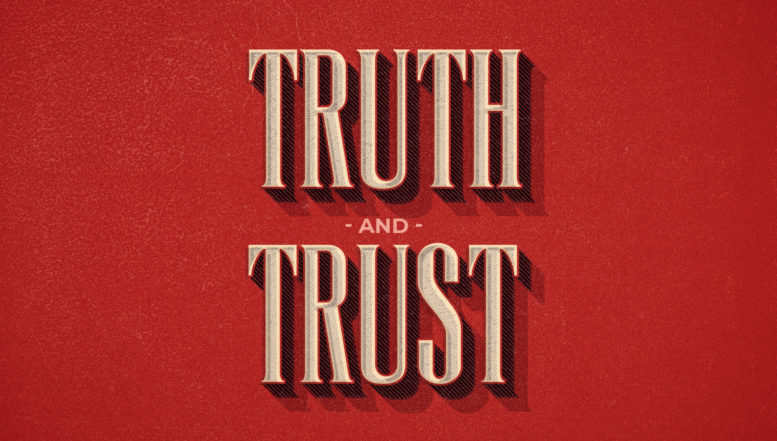Truth and Trust… Can they be separated?
I might as well say what I know you are thinking. If you are anything like me, thoughts like these must be going through your mind: What has happened to truth? Who can we trust? Can they be separated? What happens when truth loses its opposite stabilizing pillar, namely trustworthiness? Can a society last when there are no longer genuine pillars of truth and people we can trust? On what foundations are we going to raise our families? How do we know if we are drinking cool aid? Just like you, I follow the news and I try to make sense of what is happening in our culture. In our very polarizing culture, mudslinging has become a daily sport as lines are drawn in the sand reinforced by our favorite echo chambers, either Fox News or CNN. When I listen to the “Me too” and the “Church too” voices I see the collapse of trust in the very people whom our society has ordained to be trustworthy guardians of truth. How does it make you feel when you hear murmurs of a “post-truth” culture? As I am writing I can feel the ground shaking underneath me. Something deeper is going on…
It seems that the western world is in the midst of a titanic cultural shift. It seems like the Enlightenment era was not so enlightening after all. For all the advances in reason and logic, it slowly dawned on us that we are not merely the summation of what we think. The worldview known as modernism is being replaced by a new worldview called postmodernism. (In the Midwest this is not always easy to see, but it is there nevertheless). This shift is a revolution in how people think. It is not so much a philosophical shift as it is a cultural shift. The modern area relied heavily upon human reason, the reliability of science, and placed great value on individualism. Postmodernism, on the other hand, operates through a lens that wants to deconstruct everything and challenge all previous assumptions about truth. The result is deep skepticism about truth.
Dissatisfaction with the church runs high with the younger generations, and many reports experiencing the church as hypocritical, judgmental, boring or irrelevant. Dave T. Olson’s important study on church demographics also shows that the church is not keeping up with population growth in the USA. Approximately 3,700 churches close their doors permanently every year (71 per week). In 2005 only 17.5% (combined evangelical, mainline, Catholic and Orthodox) adults attended church in the USA. David T. Olson predicts if trends continue, that church attendance will drop to 14.7 % by 2020. Reggie McNeal points to another sobering trend among young Christians. Many of those leaving the church are doing sonot because they have lost their faith but to preserve their faith.
If I were to put my hand on the pulse of this throbbing reality, I come to the conclusion that truth is built on trust. When trust is gone, truth has no real anchors. Given that all of life is sacred, in my view, this applies to the spiritual as well as the empirical world. So if we want to safeguard the anchors of truth, we have to pay attention to anchors we can trust. If you want to know what I think as a Christian, you have come to the right place. As far as spiritual truth is concerned, I believe truth is a person, first and foremost. I get there because, underneath my truth claims, I believe there is someone who can shoulder the truth claims he makes. His name is Jesus.
In John 18: 33-38, in response to Pilate’s question, “Are you the King of the Jews?” Jesus answered, “My kingdom is not from this world. If my kingdom were from this world, my followers would be fighting to keep me from being handed over to the Jews. But as it is, my kingdom is not from here.” Pilate asked him, “So you are a king?” Jesus answered, “You say that I am a king. For this, I was born, and for this I came into the world, to testify to the truth. Everyone who belongs to the truth listens to my voice.” Pilate asked him, “What is truth?”
That is a jarring question asked by Pilate and I’m sure a question you are asking too.
This Thursday at PubTheology you will have a chance to unpack this with me… Our primary question is going to be: “Can truth and trust be separated?” “What do you make of my position that truth is built on trust?” “Do you think that we can think our way to transformation?”

